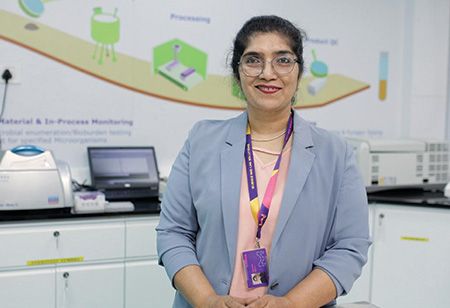Dr. Veena Panicker, Director - BioMonitoring, Merck Life Science

Dr. Veena Panicker, Director - BioMonitoring, Merck Life Science in a recent interaction with India Pharma Outlook shared her views on how the growing consumer demand for safer, higher-quality food and beverages in India has influenced the adoption of advanced microbiological testing methods in the sector, how are food and beverage manufacturers integrating rapid microbiological testing to ensure compliance with both Indian and international safety standards and more.
To begin, how has the growing consumer demand for safer, higher-quality food and beverages in India influenced the adoption of advanced microbiological testing methods in the sector? Please share some notable studies.
There has been a significant shift in the food habits of Indian consumers post the COVID-19 pandemic, which reflects an increased focus on health & wellness. Today, consumers have started to discern what they are consuming and have also started paying close attention to the product quality, ingredient sources, and overall nutritional value of the food. Hence, this shift has resulted in a surge in demand for wellness-focused products as well as high-quality packaging. This trend has intensified over the past three to four years.
Driven by the increasing consumer interest in health-conscious products and strong regulatory drive from FSSAI, the Indian food ingredients market is anticipated to grow at a CAGR of 10 percent until 2029. Furthermore, the country is becoming one of the surplus manufacturers of dairy and plant-based products that have helped create new opportunities for food exports.
The surge in exports of food products has also been driven by the demand from the Indian diaspora for authentic Indian food, specifically processed foods, spices, and dairy. However, Indian food exporters should stay vigilant regarding meeting the regulatory standards of international markets.
A shift towards dietary trends like plant-based foods, and an increased focus on health and wellness are some of the important factors that have influenced the changing dynamics of food consumption. As a consequence, the Indian food industry is poised for strong and sustainable growth in the coming years.
With the rising focus on microbial contamination, especially during the post-COVID era, how are food and beverage manufacturers integrating rapid microbiological testing to ensure compliance with both Indian and international safety standards?
It is important to understand the established methods in microbiological testing before discussing rapid microbiological testing. This falls under hazard prevention guidelines, regulated at global standards specifically by the Food and Agriculture Organization (FAO) and Food Safety and Security Authority of India (FSSAI). The Food and Agriculture Organization’s Codex principles render clear guidelines on acceptable levels of pathogens in food. We do come across news reporting untoward incidences due to the consumption of contaminated foods. Additionally, millions of people fall sick due to the consumption of contaminated food or water. Hence both regulation and surveillance are essential to ensure public safety.
Traditional microbiological methods depend on the visible growth of microorganism colonies, which can take up to 5 – 10 days; these methods are relevant & effective in identifying the pathogens. However, these are time-consuming and impractical for testing perishable or ready-to-eat foods such as fresh salads where the results are required more quickly.
This is where rapid microbiological testing comes into the picture. It allows faster results and empowers sellers and consumers to access microbial load quickly without a lengthy laboratory wait. As a result, rapid testing methods today are becoming relevant and acceptable. However, these should comply with regulatory standards that are given by the FSSAI. This requires the manufacturers to validate the effectiveness of rapid testing technologies even before granting licenses for their use.
One of the critical aspects of microbiological testing, specifically with rapid methods is to handle complex food matrices. For instance, certain foods such as masala-coated peanuts comprise spices that include pepper, curcumin & ginger that can inhibit microbial growth. Hence, these spices will complicate the process of microbial extraction, making it important to refine testing techniques for accuracy. It is crucial to ensure the reliability of these methods within complex food matrices in rapid microbiology.
Looking ahead, what advancements do you foresee in microbiological testing over the next few years, and how do you anticipate these innovations will reshape food safety standards and consumer confidence in India’s food and beverage market?
Advances in rapid technology offer a critical opportunity for enhancing food safety by identifying potential contaminants accurately down to the species level. Advanced technology, accurate result interpretation & skilled technicians are the three major factors for achieving success. Also, it is important to build a well-qualified workforce of microbiologists who will help to align our testing capabilities with global standards and ensure compliance with international regulatory bodies as the food products are exported.
One important aspect to be considered is the continuous monitoring in every step of food processing. For example, in dairy processing, risk assessment involves monitoring every step like animal feed, milk harvesting, milk collection, processing, and distribution. This ensures better quality of output with reference to both chemical contaminants and microbial load. This would hold true for all processed foods.
Strengthening food laboratories is highly essential for meeting these goals. Government support is aiding efforts for modernizing state labs as well as deploying mobile food testing labs via FSSAI. They also facilitate testing, training, and work towards increasing public awareness. Furthermore, high-level referral laboratories are also available for supporting complex cases that state & mobile labs may encounter.